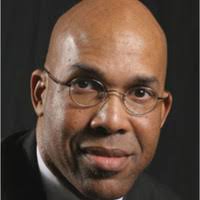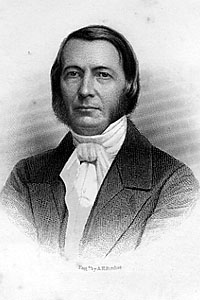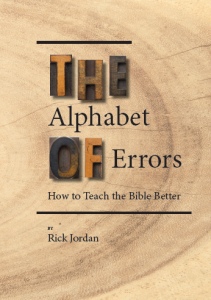“This book should come with a warning label,” Allen Callahan says of the Bible.

In my interview with Allen (which will post this Thursday) we covered, as we always do, “who has been a ‘great Bible teacher’ in your life?” For Allen, it was a professor who was himself taught by Rudolf Bultmann, a renowned German theologian. We then talked about how European-based interpretation is not the only source one should use in doing background study for a lesson.
Allen broke from the European tradition in his fresh interpretation of the book of Philemon, seeing Onesimus not as a runaway slave, but as an estranged brother. Allen thought this was a new interpretation until he did research that led him to the sermons of 19th-century American abolitionists. This led him to his doctoral dissertation and his first book.
Slavery and the Bible
His most recent book is called The Talking Book: African Americans and the Bible. In the interview, warns that modern-day interpreters must be very careful with the Bible. The interpretations we promote could harm others.

In the book’s chapter titled, “The Poison Book,” Allen demonstrates how Christians used the Bible to justify slavery. “Bitter experience had taught [Frederick] Douglass and other slaves and former slaves that the master class of the United States bore a whip in one hand and a Bible in the other.”1
He quotes from the narrative of a fugitive slave, William Wells Brown:
It was not uncommon in St. Louis to pass an auction-stand, and behold a woman upon the auction-block, and hear the seller crying out, “How much is offered for this woman? She is a good cook, good washer, a good, obedient servant. She has got religion!” Why should this man tell the purchasers that she has got religion? I answer, because in Missouri, as far as I have knowledge of slavery in the other states, the religious teaching consists in teaching the slave that he must never strike a white man: that God made him for a slave; and that, when whipped, he must not find fault for the Bible says, “He that knoweth his master’s will and doeth it not, shall be beaten with many stripes!” And slaveholders find such religion very profitable to them.2
Biblical interpretations clash

There were Christians who used the Bible to fight against slavery. Allen mentions the Quakers, including the founder, George Fox, who insisted that any Christian following the Golden Rule could not own a person. However, Southern ministers had a different interpretation of the Golden Rule. “Writing for the Southern Presbyterian Review in July 1850, James Henley Thornwell … maintained that the Golden Rule only required that ‘we should treat our slaves as we feel we ought to be treated if we were slaves ourselves.’”3
Allen concludes his chapter, “African Americans found the Bible to be both healing balm and poison book. They could not lay claim to the balm without braving the poison. The same book was both medicine and malediction. … Their cure for the toxicity of pernicious scripture was more scripture. The antidote to hostile texts of the Bible was more Bible, homeopathically administered to counteract the toxins of the text.”4

The Bible continues to be a book used for healing and for hurting. Take any “hot button” issue of the day. Any number of Christians take any number of texts to prove their point of view. Interpretation of scripture is not a science. It is not objective. There is not one infallible Christian point of view. Biblical interpretation is an art. It is subjective. At our best, we will get something wrong. History will be our judge. As will Jesus. What is required is discernment based on the teachings of Jesus, including the Golden Rule, and the two greatest commandments, to love God and to love our neighbor. Hopefully, history will be on our side and we will be on Jesus’s side.
- Allen Dwight Callahan, The Talking Book: African Americans and the Bible (New Haven: Yale University Press, 2006), 23. [↩]
- Callahan, 23, quoting from William Wells Brown, The Narrative of William W. Brown, a Fugitive Slave (Chapel Hill: University of North Carolina Press, 1996), 82. [↩]
- Callahan, 36, quoting James Henley Thornwell, “Slavery and the Religious Instruction of the Coloured Population,” Southern Presbyterian Review (July 1850), 135. [↩]
- Callahan, 40. [↩]

